Persistent grassroots and health care activism brings modicum of justice to North St. Louis County
By KATHLEEN NELSON
Karen Nickel shoulders the burden of St. Louis' legacy as a nuclear dumping ground for herself, her family and her neighbors.
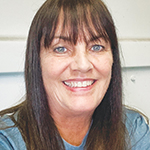
Nickel
"I struggle some," says Nickel, who has been diagnosed with lupus, psoriatic arthritis and fibromyalgia. "It depends on the day, but for the most part I still have the fight in me. I have good insurance. I have access to the bloodwork and labs that I need. But I have four kids and seven grandkids, and there's been times they haven't had access to health care. And even more important, the community is suffering."
A co-founder of Just Moms STL, Nickel's North Star for a decade has been easing the suffering of the community around Bridgeton, Missouri, 15 miles northwest of downtown St. Louis. After years of protests, advocacy, rallies and demonstrations that delivered promises, and fits and starts of progress, her cause is getting additional support from SSM Health Foundation, which recently received a five-year grant worth a total of $5.3 million to collaborate with St. Louis-based IFM Community Medicine on improving access to health care for her neighbors.
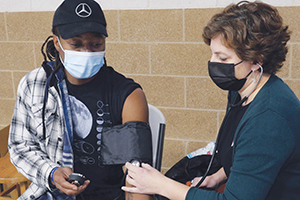
Through Connection for Health and Healing, SSM Health is working to increase health care outreach and access in underserved areas of North St. Louis County. SSM Health launched the program in partnership with the local nonprofit IFM Community Medicine. Rachel Navarette, an IFM nurse practitioner, takes a blood pressure reading at a community health fair the partners held at an elementary school in November.
IFM Community Medicine is a nonprofit that works with community partners to set up clinics at shelters, schools, residential facilities, food pantries, senior centers and other points of need throughout metropolitan St. Louis.
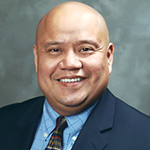
Villaflores
"We were blessed to receive the grant," says Dr. Herbert Villaflores, a psychiatrist at SSM Health DePaul Hospital in Bridgeton. He has taken on the role of physician champion for the project known as Connection for Health and Healing. "But in my eyes, this is a community effort. Our goal is collaboration. Our partners know the community and can help us best address their needs."
Atomic hangover
Nickel's childhood stomping ground and her current home bear the environmental consequences of war work done by Mallinckrodt Chemical Works of St. Louis. The company enriched uranium that was used to develop the bombs dropped on Hiroshima and Nagasaki. Toxic byproducts from the project ended up in both Coldwater Creek, near Nickel's childhood home, and the West Lake Landfill in Bridgeton, just 2 miles from her home of the past 23 years in nearby Maryland Heights. People who live near the creek and landfill have reported disproportionately high diagnoses of the chronic conditions Nickel contends with, as well as rare cancers, lung issues and a host of other health problems.
The Environmental Protection Agency designated the creek and landfill Superfund sites in the 1990s and took urgent notice again in 2010, when a fire was discovered beneath the landfill's surface moving toward the location where radioactive waste was buried. The landfill is near St. Louis Lambert International Airport and about 2 miles from SSM Health DePaul's campus.
Nickel and Just Moms STL co-founder Dawn Chapman became champions for the residents of the working class neighborhoods impacted by the contamination. Many of those people had lacked access to basic health care even as they suffered or died from rare cancers.
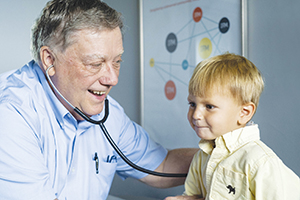
Dr. David Campbell, founder, president and chief executive of IFM Community Medicine, says SSM Health is leveraging his nonprofit's experience starting clinics for the medically underserved in the St. Louis area to make health care more accessible to residents in portions of North St. Louis County.
The duo lobbied state, national and local governments, mustering community support and activism. They staged demonstrations and information sessions — often with the help of SSM Health DePaul's founding congregation, the Franciscan Sisters of Mary.
Their advocacy helped establish the Bridgeton Landfill Community Project Fund, a $12.5 million settlement between the state of Missouri, the landfill operators and refuse companies that use it. The grant to SSM Health and IFM is the last and largest to be awarded to nonprofits that serve the residents of Bridgeton and adjoining communities.
Hand and glove
SSM Health's partnership with IFM initially developed more than a year ago, when they collaborated on a clinic at one of the neighborhood's residential behavioral health facilities.
Dr. David Campbell, founder, president and chief executive of IFM, says, "DePaul came to understand what we do and said they had been looking for a partner" to bring service to the underserved around them. IFM was already doing some of that work. "They were confident of their ability to do surgery and inpatient care but wanted to leverage our experience and insight into community programs," he explains.
Villaflores describes the partnership as "a perfect and easy fit."
Both doctors emphasize that all residents within a 4-mile radius of the landfill are eligible for services through Connection for Health and Healing whether they think they suffer from the effects of the landfill or not, whether they have insurance or not. The first goal is to open multiple points of entry for them: in elementary schools, community centers, fire departments and faith communities. The second is to offer services to address physical and mental health, as well as food insecurity.
Villaflores and Campbell agree that the sprawling SSM Health DePaul campus can be intimidating. "That's one of the barriers people in the community face," Campbell says. "It's easy to get lost. This model takes services to people in places they are comfortable with, where they already have roots."
Eyes and ears in the community
IFM hit the ground running, hiring nurse practitioners, a community health worker, and establishing three school-based clinics in the earmarked area. Campbell says IFM plans to add additional nurse practitioners and community health workers in subsequent years of the five-year grant.
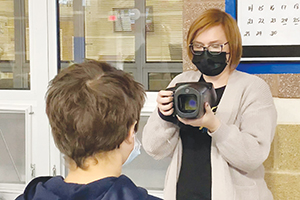
Christina Ehrlichman, operations manager for Vision for Kids, assesses a child at a November health fair sponsored by Connection for Health and Healing.
Both he and Nickel stress the importance of the community health workers learning about the history of the landfill and the record of rare cancers in the catchment area for Connection for Health and Healing. The community health workers will listen to what residents say they need, connect them to health services and report back to SSM Health DePaul.
"This will open the doors to so many doctors at DePaul, to get the residents the help they need," Nickel says.
Villaflores says SSM Health DePaul Hospital also plans to increase its community health staff. He added that the hospital will use existing programs and infrastructure in novel ways to meet community needs. Among the services being initiated or enhanced are:
- MOMS Line and MOMS Line Support Groups. These services, which connect new mothers with peer coaches, counselors or doctors, will be expanded.
- Community outreach workers at SSM Health Behavioral Health Urgent Care on the DePaul campus will provide patients with insurance enrollment assistance, resources to address food insecurity, and referrals to DePaul's network of primary care physicians and specialists.
- In October, SSM Health DePaul opened the Bread Basket community food pantry on its hospital campus. In addition to addressing hunger in the area, it will be convenient for patients, who will be able to pick up food while on campus for medical appointments. It is operated in partnership with the St. Louis Area Food Bank.
"A big part of this grant is bridging the accessibility gap," Villaflores says. "There's not always a lot of trust in health care, so we need to meet these residents where they are. Everyone is going to need health care. So, let's forge relationships early, get them the insurance they are eligible for and the services they need. We — and they — will be ready when they need us."
Coming full circle
The project kicked off by offering flu vaccines as part of a community health fair in early November at a neighborhood elementary school. Just Moms STL also shared its community health reports, and advisers provided assistance signing up residents for health insurance, Medicare and Medicaid.
Through similar events and clinics, SSM Health and IFM hope to reach 4,000 residents in the first year and gather baseline data to tailor the project to the needs of the 70,000 people living in the area.
"These types of partnerships between health care providers and nonprofit partners are on the frontier addressing community needs," Villaflores says. "As the project progresses, we'll see the patients coming through and be ready to offer more services."
Nickel looks at the grant as a return to SSM Health's roots. Collaborating with the sisters on vigils, advocacy and demonstrations, she learned the congregation's history and came to rely on their spiritual strength when she grew frustrated.
"This grant, these services, are based on the foundation of the sisters' mission, how they went out to serve the poor and sick where they were," she says. "Now, we're able to restart that legacy. We hope this is an umbrella that will cover so many things going on in this community."